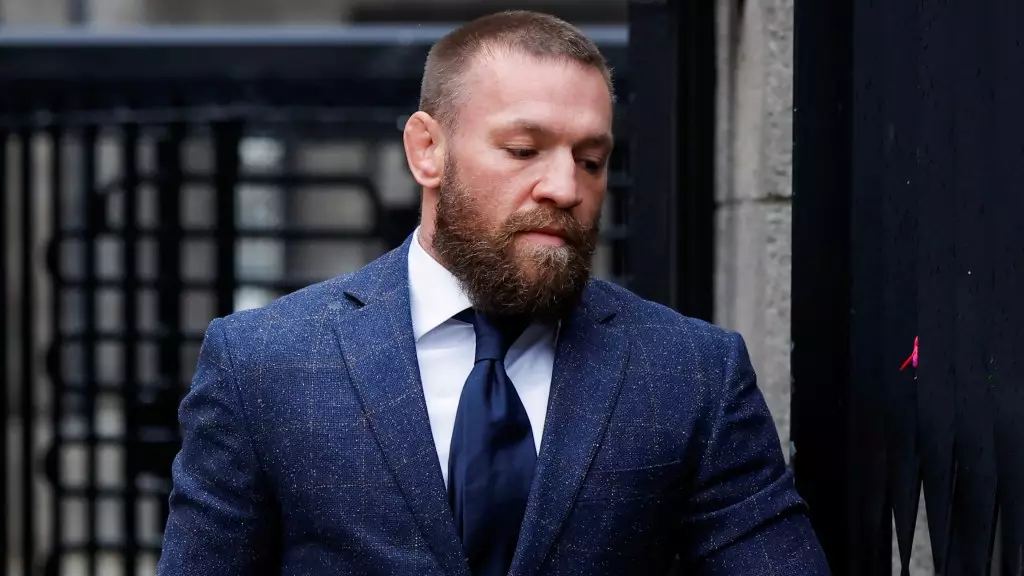The civil lawsuit initiating significant public and media interest involves prominent UFC fighter Conor McGregor. It revolves around grave allegations of sexual assault levied against him and his co-defendant, James Lawrence, by the plaintiff, Nikita Hand. This contentious case, which reached its closing arguments in a Dublin courtroom, encapsulates complex themes of consent, memory, and the moral obligations of public figures.
Nikita Hand’s lawsuit stems from an incident in December 2018, which she alleges occurred after a night of drinking and partying. Despite the absence of criminal charges, Hand pursued a civil claim in 2021, illuminating the ongoing distress and trauma she associates with the event. As the trial unfolded, the procedural journey took multiple twists and turns, reflecting both the gravity and the complexities of such accusations in high-profile cases.
Central to the trial were the testimonies delivered by both McGregor and Lawrence. McGregor’s time on the witness stand revealed a fervent denial of the allegations. During his interrogation, he clarified his position, labeling the claims as mere fabrications that have instilled a lasting fear in him. This stark denial was accompanied by a confession regarding his past cocaine use, which he maintained was irrelevant to the nature of the encounter with Hand.
Conversely, Lawrence’s testimony painted a different narrative. He conveyed his version of events, claiming that interactions with Hand were consensual, a stark contrast to Hand’s memories of the night. Notably, Lawrence described scenes that purportedly suggested a lack of distress from Hand, statements that were marred by their contradiction to her published recollections of the incident. Given the conflicting accounts, the jurors faced a demanding task: discerning credibility amidst a quagmire of narratives.
Moreover, evidence such as surveillance footage and witness testimonies from individuals like Danielle Kealey—who was in a connecting hotel room—added layers to the court’s examination. Comments regarding Hand’s alleged incoherence during the incident further complicated the discourse on consent and culpability.
The contrasting strategies employed by the respective legal teams were apparent during closing arguments. McGregor’s defense attorney, Remy Farrell, made a concerted effort to urge the jury to assess the facts objectively, stressing the importance of viewing evidence over preconceived notions of McGregor’s public persona. He highlighted discrepancies in Hand’s memory and presented the gathered surveillance footage as undermining her claims. Such approaches aimed to sway jurors toward reasonable doubt and mitigate the impact of emotional testimonies.
In contrast, Hand’s attorney, John Gordon, framed the narrative around the trauma experienced by his client, urging the jury to understand the mental and physical toll of the alleged assault. By presenting testimony from medical professionals underscoring the psychological consequences of the incident, Gordon leveraged emotional appeals to bolster Hand’s claims. This dichotomy in courtroom tactics exemplifies how legal professionals navigate the drama of the judiciary landscape to potentiate their clients’ positions.
The trial holds significant implications not only for the parties directly involved but for society at large. It brings to the forefront ongoing discussions regarding the accountability of public figures in cases of sexual assault, emphasizing the need for transparency and societal responsibility in addressing such allegations. The complexities surrounding consent, victim testimony, and the ramifications of public scrutiny are indeed subject to intense debate.
The burgeoning visibility and scrutiny of the case mark a critical juncture in the discourse surrounding sexual violence, the #MeToo movement, and shifting societal perspectives on consent. As the trial continues to resonate within public consciousness, it forces a reconsideration of how allegations are received and the implications of celebrity status on legal accountability.
As the trial recommences in Dublin, the fundamental questions remain—how do we uphold justice in the face of conflicting narratives, and what does this case reveal about broader societal issues? With the jury’s deliberation looming, the stakes have never been higher for all parties. The potential outcomes could have lasting consequences, not only for McGregor and Lawrence but also for societal views of consent and the legal frameworks addressing sexual assault allegations. The pursuit of truth and justice must remain at the forefront as this complex legal drama continues to unfold.

